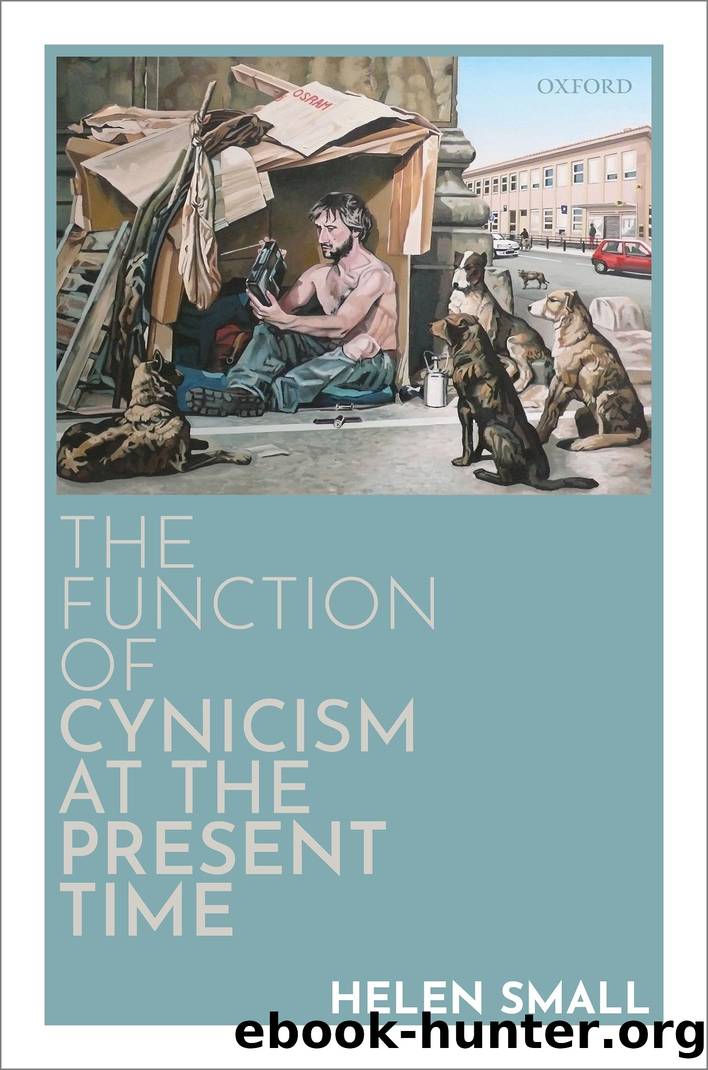The Function of Cynicism at the Present Time by Small Helen;

Author:Small, Helen; [Small, Helen]
Language: eng
Format: epub
Publisher: Oxford University Press, Incorporated
Published: 2020-05-28T00:00:00+00:00
They kindly offered me the example of their civilisation as a help to mend ours; and I, not with any vain Anglicism, for I own our insular civilisation to be very unsatisfactory, but from a desire to get at the truth and not to deceive myself with hopes of help from a quarter where at present there is none to be found, have inquired whether the Americans really think, on looking into the matter, that their civilisation is much more satisfactory than ours.â(22)
The tone is earnest; the attempt at naming and shedding national self-interest sounds arduous enough, but the assumptions of what is to be found on the other side of the Atlantic are cynical: America is pre-emptively judged to have made poor use, to date, of its much-vaunted freedom from the old and âunsatisfactoryâ âinsular civilisationâ. It has shirked the work of criticism, and contented itself with a pre-emptive and complacent view of its âcivilisationâ. He (the clearer-sighted one) will not delude himself with hope of help where âthere is none to be foundâ.
If cosmopolitan universalism, based on an ever more generally available liberal education in âright reasonâ, is the overall direction of travel here, Arnold has an odd way of going about things. Patriotic jostling of a âmy culture is better and freer than your cultureâ sort is not the most promising route out of the narrowness of oneâs own national affiliations, but there was (and is) a market for it.61 Moreover, the approach has at least the virtue of a degree of honesty about the local limitations and biases of where it speaks from. As Bruce Robbins puts it, with an eye on nationalism as a possible standpoint for criticism of global economic inequality: â[s]aying nasty things about foreign goods [here, culture] and/or the foreigners who made them does not seem a likely path toward cosmopolitanism in a significant sense of the termâ, but it has âa certain heftâ, a âgroundedâ acknowledgement of motivating interests.62 In Arnoldâs case, that acknowledgement involves a critical element of realism, not only towards his own position but also towards the broad consensus of opinion about him in America, at the point when he began the tour. There was, as John Henry Raleigh showed in his classic study of Arnold in America, a general perception, even among more admiring critical readers, that Arnold suffered from being too English, meaning: âpriggish and artificialâ, over-concerned with âcorrectnessâ in the use of the language, âamateurishâ, and (Raleigh adds) personally dislikable on the basis of his writing (âvariously pictured as the ineffectual dilettante, the cool sophisticate, or the supercilious destroyerâ [66]). The antagonism he brings to the podium is, in that context, a way of acknowledging his reputation head on, playing up to the character already in circulation.
It is one thing to adopt the rhetoric of competitive nationalism as a fictitious basis for espousing the transnational value of âcultureâ when the argument is theoretical, conducted on home ground, at a long distance from the comparator civilization; it is another to attempt that line of reasoning on the foreign soil in question.
Download
This site does not store any files on its server. We only index and link to content provided by other sites. Please contact the content providers to delete copyright contents if any and email us, we'll remove relevant links or contents immediately.
Verus Israel: Study of the Relations Between Christians and Jews in the Roman Empire, AD 135-425 by Marcel Simon(548)
Caesar Rules: The Emperor in the Changing Roman World (c. 50 BC â AD 565) by Olivier Hekster(522)
Infocracy by Byung-Chul Han(514)
Europe, Strategy and Armed Forces by Sven Biscop Jo Coelmont(477)
Banned in the U.S.A. : A Reference Guide to Book Censorship in Schools and Public Libraries by Herbert N. Foerstel(444)
Reading Colonial Japan by Mason Michele;Lee Helen;(441)
The Roman World 44 BC-AD 180 by Martin Goodman(432)
Give Me Liberty, Seventh Edition by Foner Eric & DuVal Kathleen & McGirr Lisa(432)
DS001-THE MAN OF BRONZE by J.R.A(418)
The Dangerous Life and Ideas of Diogenes the Cynic by Jean-Manuel Roubineau(416)
The Oxford History of World War II by Richard Overy(414)
Introducing Christian Ethics by Samuel Wells and Ben Quash with Rebekah Eklund(407)
Imperial Rome AD 193 - 284 by Ando Clifford(405)
american english file 1 student book 3rd edition by Unknown(386)
Literary Mathematics by Michael Gavin;(372)
Basic japanese A grammar and workbook by Unknown(365)
Language Hacking Mandarin by Benny Lewis & Dr. Licheng Gu(351)
The Oxford History of the Renaissance by Campbell Gordon;(330)
How to Reach the 9.0 in IELTS Academic Reading by IELTS Medical(330)
